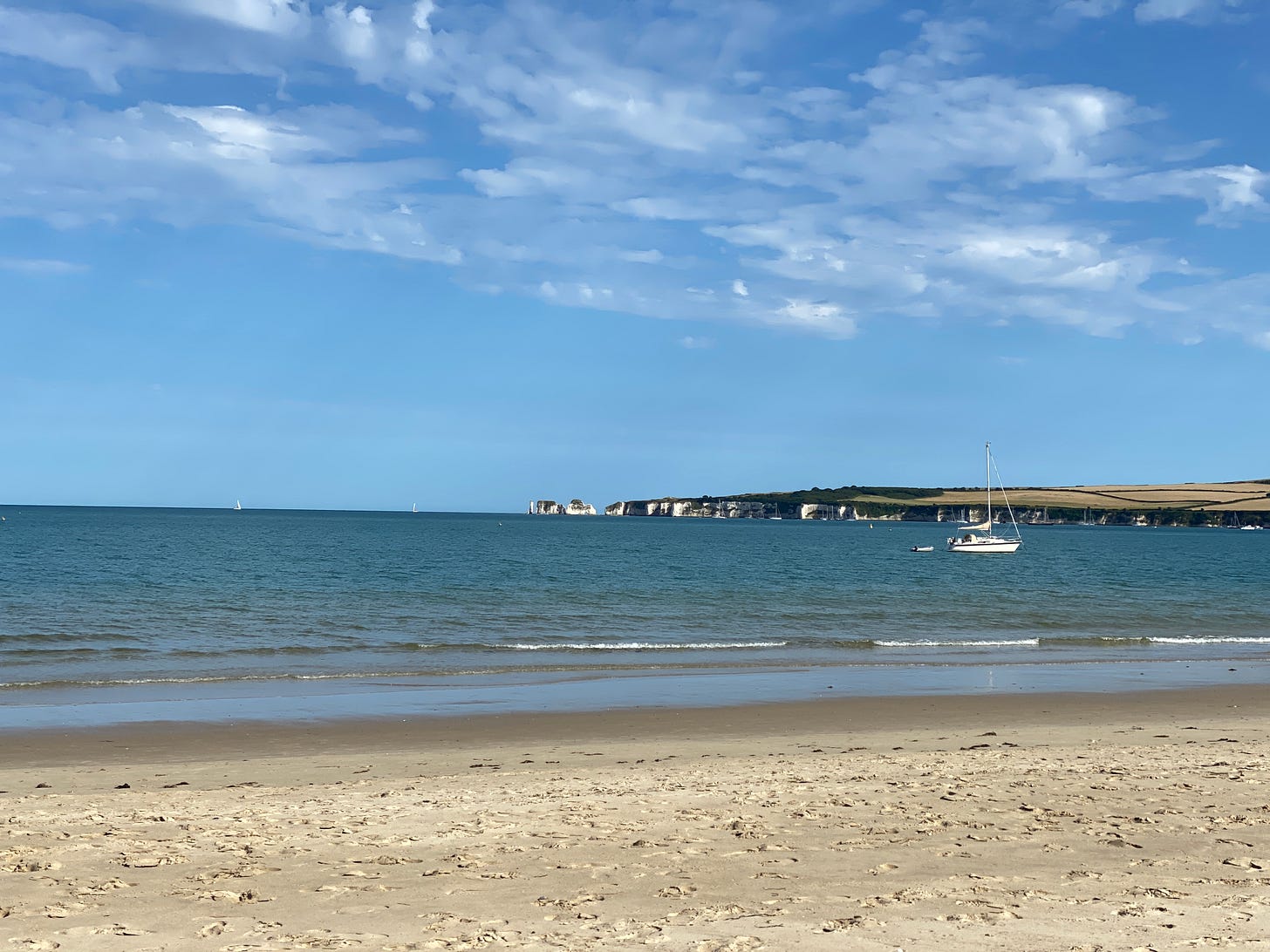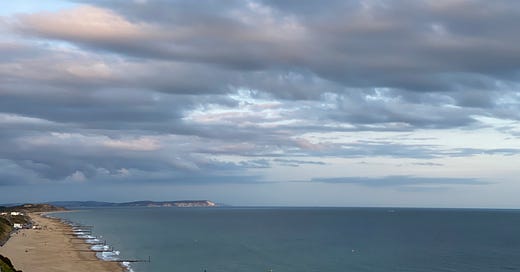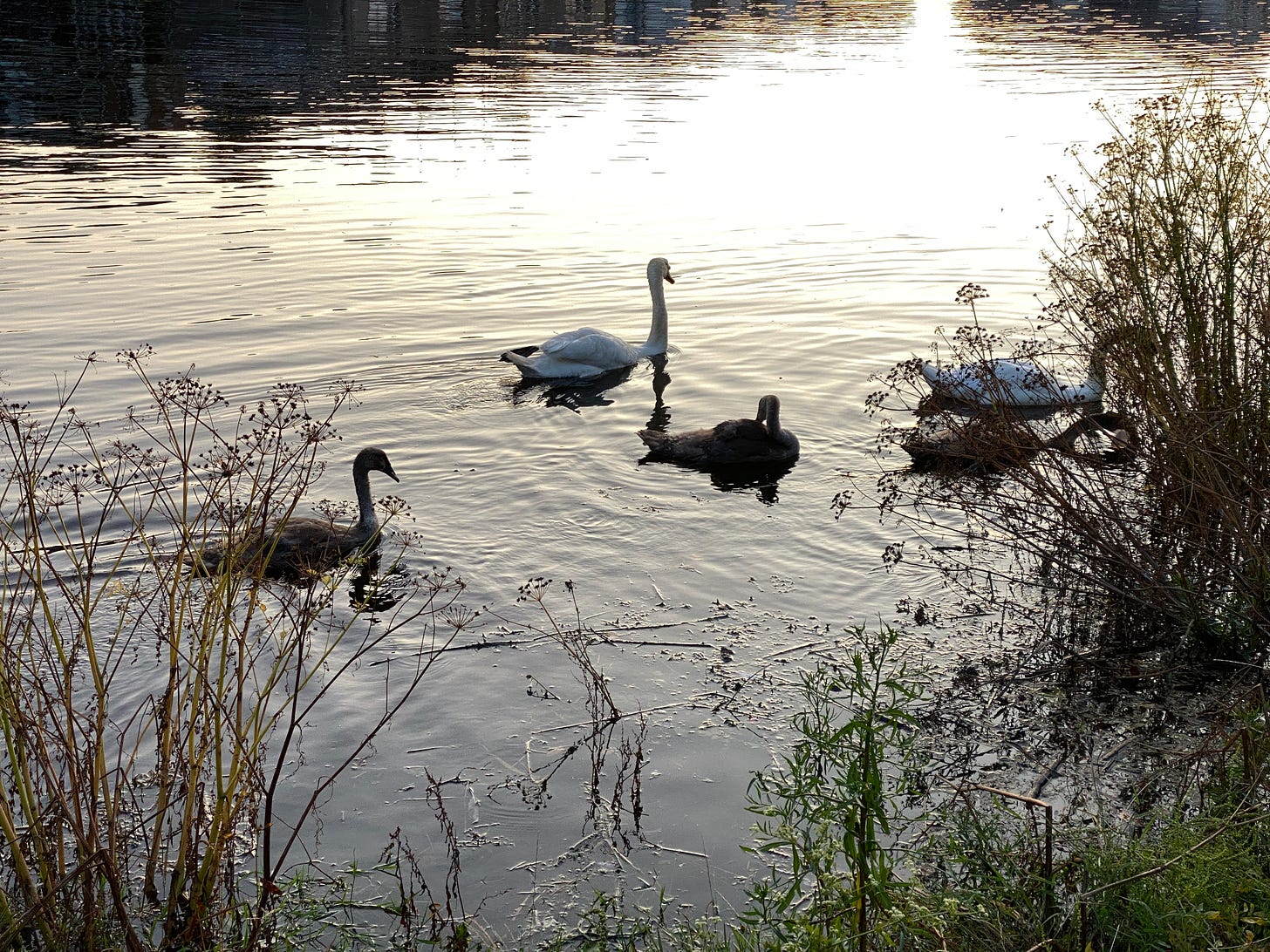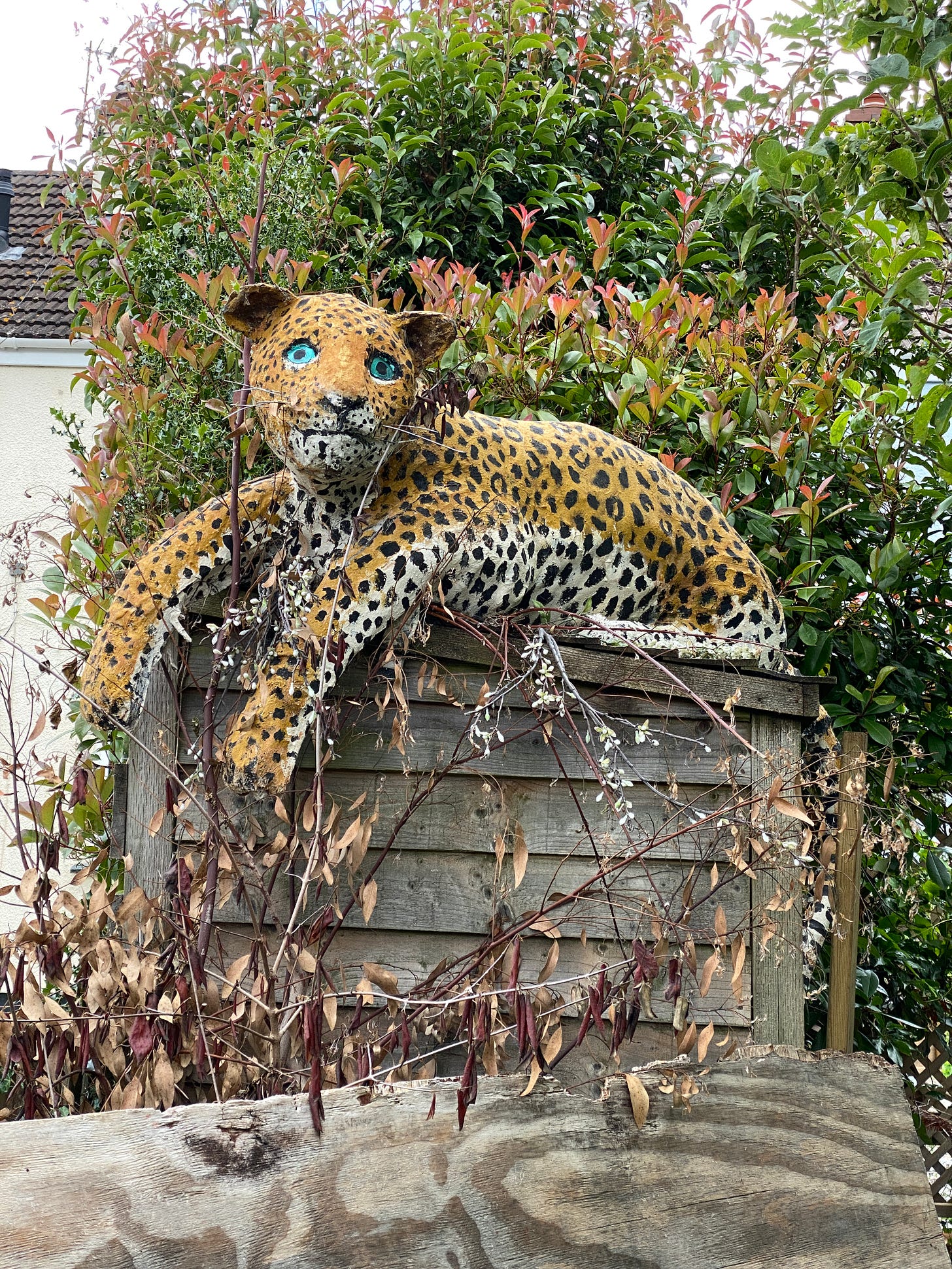Fermata
In less than a week I will finally take a long break from travelling to do work and from all but a minimum of obligations, for the whole of August. I will write, make art and spend a good amount of time staring at the horizon from the Dorset coastline. It feels as though I haven’t stopped since mid-March, but now I am on the home straight. A few moments ago I came in from walking for 20 minutes along the beloved stretch of clifftop at the end of my road, and looking out to the Polar Bear (or The Needles), the sea was calm and there was a light south westerly breeze. (In the picture above you can see the tiny white bear in the lower left of the scene, today her cubs were a little pink, from the sunset, it’s worth zooming in.) From the marks on the sandy beach, you can see it is low tide.
Only a few days ago, I was walking long the River Dart with my friend artist Nina Cadzow, the night before my book launch, and the tide was at its high point, just passing slack-water. We could see the tiny rim of wet above the level of the river itself, showing that the flow had turned already and the river was starting to drop. This change would have been imperceptible at sea, but the flood-defence wall gave us something from which to read the state of the tide.1
I have been thinking lots about boundaries, edges and limits, partly around the use of electronics, my engagement with ‘the machine’, and my own personal energy. There have been some good posts over the last few months from several writers I follow here about their own need for, and strategies around, such things. I have found this a fertile and timely area of reading, and have a few thoughts to add to the collective mulling-over of this somewhat gritty topic. Last week, demonstrating making paint from badger-dug chalk, local red ironstone and some liquid gum Arabic, all pulled from a homemade basket, the audience could have been forgiven for thinking I live in some sylvan glade with little birds for helpers. And although that is occasionally the case, most of the time my work happens because I have been active online, letting people know what I am up to, where I am teaching, details of my book, writing this newsletter, or other screen-based activity. That’s the nature of being a self-employed artist or writer in 2023, which I am sure many of you will know first-hand.
Rest
As I wrote last week in Grasp the nettle, certain hand crafts, such as making cordage from foraged fibres, can settle my mind and heart swiftly, as if by magic (the magic of touch). But this week I have set myself clear limits on my use of screens, for the first time in my life, not because I am using them more than usual, but because it feels right. Since the age of eleven, I was always able to ‘sleep for England’, it was a real superpower, to always get a good night’s sleep. My sleep has suffered since March, no doubt caused by the well-known natural changes in hormone levels for women my age, but also, exacerbated by being the busiest I have been for many years with both work and family commitments. So, to begin with I have set firm rules about screen use on waking and going to bed, and this has already helped.
In the Taoist Classics, many things are listed as ‘robbers’ - things which steal our energy - such as overthinking, talking too much, rich food, alcohol, too much or too little sleep, or excessive sex… The main one which concerns me currently is ‘overinvolvement in worldly affairs’, there’s just no good translation for it, but it traditionally relates to being too tied up in current events or the life of the city or government. Many Taoist tracts were originally written for those who were obliged to work as Mandarins despite their religious inclinations. It is surprising how well the advice for contemplative young men about the machinations of office translates to my own life whizzing up and down Britain on trains, attempting to teach or learn good things. Tomorrow I will travel to the outskirts of London to spend a day with my T’ai Chi teacher and his students at the weeklong summer intensive. I organised this event, and many like it in the UK and Sweden for over 15 years, assisting with teaching, taking the register, organising many aspects of the whole event. This time I will just be a ‘punter’, going to share a few hours of what makes me feel well and to see some good old friends. The rhythms of the seasons, the year, the decades, were measured for me in the workings of the schools, both mine and my teacher’s. Now, I see a different set of markers, many of them natural ones, as I gather supplies for cordage, inks and paints, or celebrate time with family. The cycles change and are always themselves changing. This is natural.
Tempo
Some meditations.
Today I see rhythms not boundaries when I think of the limits I am setting myself around my energy, work commitments and levels of enmeshment with the machine. Like the flood defences at Totnes, the low walls I have tentatively set up are allowing me to see where the tide of information reaches, when it threatens to overwhelm my banks, and when it ebbs away. It is new, and I cannot describe it all clearly yet, but I hope at some point I will, in case it assists others who also cannot go the Full Mark Boyle Monty, but who need to lessen their entanglements.
The banks of a river allow us to see the cyclical movements of the tides just as a pane of glass allows us to briefly ‘see’ breath as the moisture fogs its surface. As I walked the tow path with Nina this week, I thought of the rhythm of sewing by hand (not machine), where the necessarily short lengths of thread give an almost song-length-feeling counterpoint to the gentle measured beat of the up down up down work of the needle, as it makes the stitches. When we sew by machine, the thread on the spool is very long, usually far longer than the work at hand. Rethreading a needle when hand-sewing is a moment to stretch, adjust the glasses, get a cup of tea, or take a breather.
Or to check a phone…
The scriptorium scratch of the quill pen dipped in ink is even more akin to the breaths taken when singing or reading aloud. The ink flows thickly at the start of the phrase and then thins until, unless dipped again, it fades away and trails off. Similarly, the voice that speaks from lungs full of air is strong and melodious, but unless we breathe in good time, flatness can creep in, and volume can diminish by the end of a breath. Yes, there are ways in which a trained singer can prolong and moderate the flow of breath, such as by supporting the breath using the diaphragm. But what I am pointing to are the limits of the dip-pen’s reservoir and the lungs’ air capacity as beautiful edges allowing us to see the ebbing tide of liquid or gas, ink or oxygen. Both are forms of embodied energy.
The same is true when we make cordage by hand, adding in threads from the distaff to the drop-spindle, or picking up stems from the dampened natural fibre pile beside us, rather than the ready-carded fibre-loaded spinning machine.2
The jug of water refilled and brought to table somehow fulfils its convivial destiny by becoming empty, and thus needing someone to refill it. No table-mounted tap is as good, (and I have used these, at swanky restaurants, even!) What is missing is the rhythm of host and guest, the embodied grace of please and thank you, the vulnerability of thirst, request, and anticipated fulfilment.
The finite nature of life and the limits we are given, and those we choose, give us meaning. Only the electronics of machines are solid-state. Tideless, endless, sameness is not to be trusted. The Classics say, ‘The Sage is out of step with the times, but in tune with the tides.’3

Embark
I do not wish to be sucked forward into the vacuum of ‘The Inevitable Future’ like the enablers of the Machine.
Nor do I want to flee ‘The Past’ like bullet from a gun, as seems to be the desire of the servants of Progress.
Instead, at the best times, I feel encouraged onward, with the support of all that came before, like a boat lifted on a tide, setting out at the right moment. Sometimes it is time to set sail, other times to stay moored. Sometimes, even, it is time to return, or to retrace my course.
I hope for the wisdom to know the tides and the clear-headedness to pay good attention. Whether I have any skill at the rudder in the coming heavy weather remains to be seen.
This week’s good thing: Totnes, Devon, UK. It’s the only place I know with leopards and herons randomly adorning people’s gardens, with almost no chain shops, an abundance of local businesses and a town-wide green ethos. I am happy to have great friends and work there and have reasons to go regularly, especially Schumacher College. If you are visiting the UK you might not be told to go here, but you should. Whether you want a castle, amazing pubs, great food or culture, it’s all here, nestled in a lush green valley with a wild river running through it.
But no, I shan’t be moving there, just regularly visiting. Because I need to be beside the sea…
Though edges and boundaries are usually rich and good places, there are always exceptions to the rule. Daniel, a friend of my T’ai Chi teacher, was in a fishing boat off Bali on the day of the Boxing Day tsunami in 2006. He remembers the boat going over what seemed a huge long swell. Everyone aboard wondered, ‘What was that?’ 20 minutes later the radio was full of distress cries. ‘Don’t come back to port,’ said the harbourmaster, ‘It no longer exists.’ What was a harmless rolling mound of water when travelling across deep seas became a wall of destruction when it met the shelving seabed next to the land.
The spinning jenny, stacked with eight rovings, was the very beginning of the industrial revolution.
Monday morning, I am just back from a day of T’ai Chi with my teacher and classmates by the river in Kingston Upon Thames, preparing to publish this piece. My teacher was talking about the moment the tide changes in the movements, going from yin to yang, from open to close. He used the analogy of slack-water to denote the seemingly timeless infinitesimal moment where flow going one way ceases and begins to slowly go the other way in our form and partner work. After 23 years studying with someone, it is perhaps unsurprising to be in sync in this way. It was as though we had discussed everything I have written above (which I wrote on Saturday). It was very heartening. I’ll have much to share over the coming weeks.








Caroline-
A beautiful reflection and one I feel completely in tune with. I kind of went off on a rant yesterday here on Substack. A somewhat unhinged yang version of this more grounded and yin one. Know the male but keep to the female, as it were. In the midst of it the insight came to me that the internet, all of it, is 'networked disconnection'.
There is a lot of good things that can and have come from this. But we know there is a cost. Many of us feel the price more and more as the gravitational pull of the machine strengthens. As the desire for its true goods, but also false promises and temptations grow. I know I have attempted to 'split the difference' and try to maximize the good and minimize the less good. That can work for a while perhaps--perhaps--but in the end it is, I think, unworkable. The effects of being online so much are just too unmistakable and in the end a net loss...no pun intended (okay, slightly intended).
So, I also feel the need to more fully reinhabit my life again. Like any addict, that is likely to be a bit painful at first. I will fail, and fall off the wagon I am guessing. But that is where I am pointing myself. For example, rather then starting my day with the internet, I went outside in morning darkness with a cup of coffee, and listened to the twittering birds underneath the shelter of the big trees. Ah, this is more like it.
One thing I want to clarify--and, ironically it may take the internet to help me do so--is that I think what I need is a kind of *interpersonal* contemplative practice. Sort of the meditative equivalent of push hands. Rather than put my energy to online endeavors I think about how I could help to form small groups, maybe just 3-5 people to re-learn, or maybe learn for the first time, how to be more fully human together, how to cultivate sharing our lives with one another. To reconnect to our own depths, to each other, to nature, and to the Divine--the unfathomable mystery-- as we understand (or don't understand) "it". How to live within the fruitfulness of unknowing.
Given how I intuit the near future is likely to go (I hope I am wrong) we are going to need this far more than the next great thing the internet coughs up for us. Either way, I know I need to relearn the art of being human in the world. Right now, I am gravitating towards Circling practice, but I am wide open other alternatives.
Lastly, I want to say, though we have only interacted through text on a screen, my sense is that you, Caroline, are a kindred spirit. We may never get to sit by the River Dart, drink tea and have a chat, but I think that would be a lovely time. I wish you nothing but beautiful things in all you do.
-Jack
THREE FRIENDS
There were three friends
Discussing life.
One said:
"Can men [sic] live together
and know nothing of it?
Work together
And produce nothing?
Can they fly around in space
And forget to exist
World without end?
The three friends looked at each other
And burst out laughing
They had no explanation.
Thus they were better friends than before.
--The Way of Chuang Tau (Thomas Merton version).
(As a side note, I studied Cheng Man-Ch'ing Yang Short form 20 years ago. There is a school of the same lineage here. I think if I can swing it I will take that up again. I look forward to it.)
I guess twizzling and making cord are two hand rhythmic activities? Did you realise there is a McGilchrist ‘twist’ to this? Two hand rhythmic makes the two hemispheres work together, or better said all symmetrical repetitive activities do that. I am planning to write an essay on the phenomenon, because indeed it is addictive in a positive way, it makes you feel good, attentive, balanced. I mentioned this to a seed grower and he immediately identified several of his tasks having this effect on him....